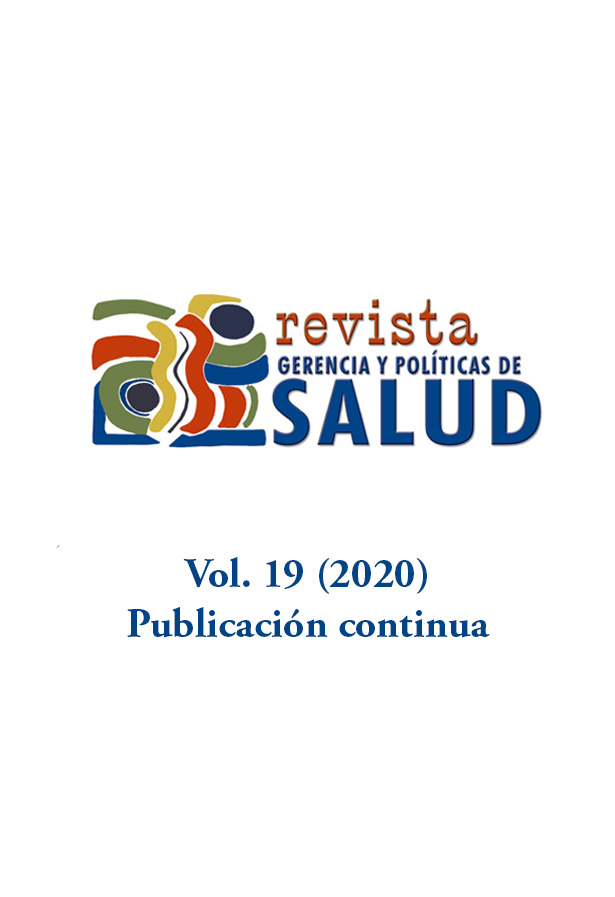Abstract
Objective: Describe the experience of the Medical Mission in the context of the armed conflict in two Colombian municipalities. Methods: Qualitative research with a comparative case study approach through 22 interviews and 3 focus groups. Analysis of the information was conducted through content analysis techniques. Results: In the context of the conflict, especially due to mobility restrictions, there were difficulties in the provision and access to health services and medicines. Transgressions to the Medical Mission such as infractions against life and infrastructure, and violations of professional secrecy were reported. In the post-agreement is recommended to improve working conditions and training of health personnel, including training in international humanitarian law and Medical Mission. Conclusion: The armed conflict substantially affected health personnel and the provision of services.Objective: To describe the experience of the medical mission in Colombia in the context of the armed conflict of two municipalities. Methods: qualitative research was done using a comparative case study approach based on 22 interviews and three focus groups. The processing of information was conducted using content analysis techniques. Results: in the context of the conflict, especially due to mobility restrictions, there were difficulties in the provision of and access to health services and medicines. Transgressions to the medical mission, such as infractions against life and infrastructure, as well as violations of professional confidentiality, were reported. In the post-agreement phase, it is recommended to improve the working conditions and health personnel training, especially in International Humanitarian Law. Conclusion: the armed conflict substantially affected the medical staff's health and the provision of health services.
2. Geneva Convention. Geneva Convention for the amelioration of the condition of the wounded and sick in armed forces in the field. Geneva 1949. http://www.tc.gob.pe/tratados/uni_DDHH/instru_alca_especifi_uni/Derecho_humanitario/conve_ginebra2.pdf.
3. Colombia. Ministerio de Salud. Resolución 1020 de 2002 (agosto 5) Por la cual se dictan medidas para la protección de la Misión Médica. Bogotá: Ministerio de Salud y Protección Social; 2002.
4. Colombia. Ministerio de Salud y Protección Social. Resolución 4481 de 2012 (28 diciembre) Por la cual se adopta el Manual de Misión Médica y se establecen normas relacionadas con la señalización y divulgación de su Emblema. Bogotá: Ministerio de Salud y Protección Social; 2012.
5. Urrego, DZ. Conflicto armado en Colombia y misión médica: narrativas médicas como memorias de supervivencia. Rev. Fac. Med. 2015; 63(3): 377-88. https://doi.org/10.15446/revfacmed.v63n3.45209
6. Boletín temático. Observatorio del Programa Presidencial de Derechos Humanos y DIH No. 3, enero de 2005. http://historico.derechoshumanos.gov.co/Observatorio/Publicaciones/Paginas/2005.aspx.
7. Comité Internacional de la Cruz Roja. Situación Humanitaria informe de actividades Colombia 2012 [Internet]. 2013. Disponible en: https://www.icrc.org/es/doc/assets/files/2013/colombia-report-2012.pdf.
8. Galeano Marin ME. Estrategias de investigación social cualitativa: el giro de la mirada. Medellín, Colombia: La Carreta; 2004.
9. Krippendorff, K. Content Analysis: An Introduction to Its Methodology. 2ndEdition. Thousand Oaks, CA: Sage Publications; 2004. 413 p.
10. Acuerdo Final. (2016). Acuerdo Final para la Terminación del Conflicto y la Construcción de una Paz Estable y Duradera. Bogotá, Presidencia de la República.
11. World Health Organization (WHO). Servicios médicos y de salud en tiempos de conflicto armado. Ginebra: Consejo Ejecutivo; 1994. Report No. EB95/24.
12. Sallami Z, Kassim Y, Selvaraj J, Parry E, Winter G. Impact of the Armed Conflict of 2015-2016 in Aden on health services and the availability of medicines. Health. 2017;09(04): 685-696. https://doi.org/10.4236/health.2017.94049
13. Betsi NA, Koudou BG, Cissé G, Tschannen AB, Pignol AM, Ouattara Y, et al. Effect of an armed conflict on human resources and health systems in Côte d’Ivoire: Prevention of and care for people with HIV/AIDS. AIDS Care. mayo de 2006;18(4): 356-365. https://doi.org/10.1080/09540120500200856
14. Mohamed AD, Abdallah E-B, Aghnaya AD. The assessment of efficiency and coordination within the Libyan health care system during the armed conflict-2011. Clinical Epidemiology and Global Health. 2016;4: 120-127. https://doi.org/10.1016/j.cegh.2015.07.004
15. Escobar ML, Bustos GM, Restrepo JE et al. Conocimiento y aplicación del Derecho Internacional Humanitario y la Misión Médica en los servicios de urgencias del oriente antioqueño. Iatreia. 2003;16(4): 263-272. http://www.scielo.org.co/scielo.php?script=sci_arttext&pid=S0121-07932003000400001&lng=en.
16. Laverde LA, López JI, Ochoa AL. Sector Salud, conflicto armado colombiano y Derecho Internacional Humanitario. Invest Educ Enferm. 2004;22(2): 62-75. 2966-Article Text-9657-1-10-20091120.pdf

This work is licensed under a Creative Commons Attribution 4.0 International License.
Copyright (c) 2020 Sara milena Ramos, Isabel Cristina Garcés Palacio, Dra, Natalia Quiceno Toro, Dra, Maria Ochoa Sierra, Edison Bedoya Bedoya., Laura Estefany Ruiz Sánchez, Marlly Andrea García Jímenez



